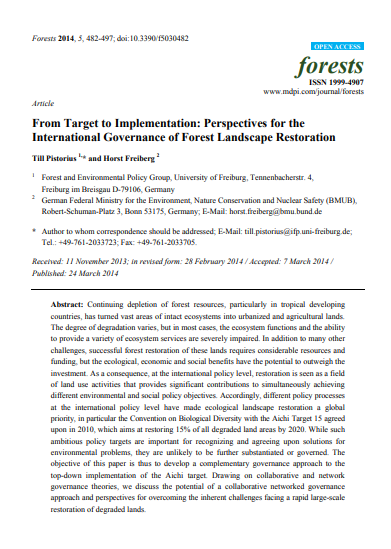Forests (ISSN 1999-4907) is an international and cross-disciplinary scholarly journal of forestry and forest ecology. It publishes research papers, short communications and review papers. There is no restriction on the length of the papers. Our aim is to encourage scientists to publish their experimental and theoretical research in as much detail as possible. Full experimental and/or methodical details must be provided for research articles.
There are, in addition, unique features of this journal:
- computed data or files regarding the full details of the experimental procedure, if unable to be published in a normal way, can be deposited as supplementary material
- we also accept manuscripts communicating to a broader audience with regard to research projects financed with public funds
- manuscripts regarding research proposals and research ideas are welcomed
Members:
Resources
Displaying 211 - 215 of 236Multi-level Governance of Land Use Changes in the Brazilian Amazon: Lessons from Paragominas, State of Pará
Land use governance in the Brazilian Amazon has undergone significant changes in the last decade. At the national level, law enforcement capacity has increased and downstream industries linked to commodity chains responsible for deforestation have begun to monitor some of their suppliers’ impacts on forests. At the municipal level, local actors have launched a Green Municipality initiative, aimed at eliminating deforestation and supporting green supply chains at the territorial level.
Achieving Conservation and Equity amidst Extreme Poverty and Climate Risk: The Makira REDD+ Project in Madagascar
Achieving forest conservation together with poverty alleviation and equity is an unending challenge in the tropics. The Makira REDD+ pilot project located in northeastern Madagascar is a well-suited case to explore this challenge in conditions of extreme poverty and climatic vulnerability. We assessed the potential effect of project siting on the livelihoods of the local population and which households would be the most strongly impacted by conservation measures.
From Target to Implementation: Perspectives for the International Governance of Forest Landscape Restoration
Continuing depletion of forest resources, particularly in tropical developing countries, has turned vast areas of intact ecosystems into urbanized and agricultural lands. The degree of degradation varies, but in most cases, the ecosystem functions and the ability to provide a variety of ecosystem services are severely impaired. In addition to many other challenges, successful forest restoration of these lands requires considerable resources and funding, but the ecological, economic and social benefits have the potential to outweigh the investment.
Multi-Scalar Governance for Restoring the Brazilian Atlantic Forest: A Case Study on Small Landholdings in Protected Areas of Sustainable Development
Implementation of forest restoration projects requires cross-scale and hybrid forms of governance involving the state, the market, civil society, individuals, communities, and other actors. Using a case study from the Atlantic Forest Hotspot, we examine the governance of a large-scale forest restoration project implemented by an international non-governmental organization (NGO) on family farmer landholdings located within protected areas of sustainable development.
Multi-Level Policy Dialogues, Processes, and Actions: Challenges and Opportunities for National REDD+ Safeguards Measurement, Reporting, and Verification (MRV)
REDD+ social safeguards have gained increasing attention in numerous forums. This paper reviews the evolution of multi-level policy dialogues, processes, and actions related to REDD+ social safeguards (e.g., Cancun Safeguards 1–5) among policy makers, civil society organizations, and within the media in Brazil, Indonesia and Tanzania, three countries with well advanced REDD+ programs. We find that progress on core aspects of social safeguards is uneven across the three countries. Brazil is by far the most advanced having drafted a REDD+ social safeguards policy.






